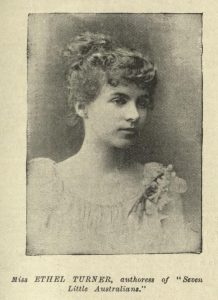[Editor: This untitled review of Seven Little Australians (by Ethel Turner) was published in The Bulletin (Sydney, NSW), 20 October 1894.]
[“A review of “Seven Little Australians” by Ethel Turner]

In her first book, “Seven Little Australians,” just published by Ward, Lock and Co., all these qualities are shown to advantage, and the result is a clever and charming narrative. Miss Turner appears to have chosen, in the humour and pathos of child-life, a subject with which she is in thorough mental sympathy, and to which she brings an admirable mental equipment.
In scope and treatment the book is a little above children, a little below most grown-ups, and it will hardly be acceptable to boys at any age; but to girls between the lights, fluttering a new and timorous soul at the meeting of the brook and river, and a brief and tremulous gown at the meeting of the calf and ankle, “Seven Little Australians” should prove at once an oracle and an ecstasy.
And when Miss Turner, like Miss Alcott, weds her little women, one hopes to be able to congratulate her upon the display of a creative strength and originality of which now we have only the promise.
Source:
The Bulletin (Sydney, NSW), 20 October 1894, p. 9 (col. 3) and p. 15 (col. 1, photo of Ethel Turner)
Editor’s notes:
Whilst the photo of Ethel Turner (p. 15) was not printed alongside the article (p. 9), it was referred to in the article, and so therefore it was deemed appropriate to include it here, rather than as a separate item. The photo was not accompanied by a related article on page 15.
pathos = compassion or pity; or an experience, or a work of art, that evokes feelings of compassion or pity
[Editor: The original text has been separated into paragraphs.]
Leave a Reply